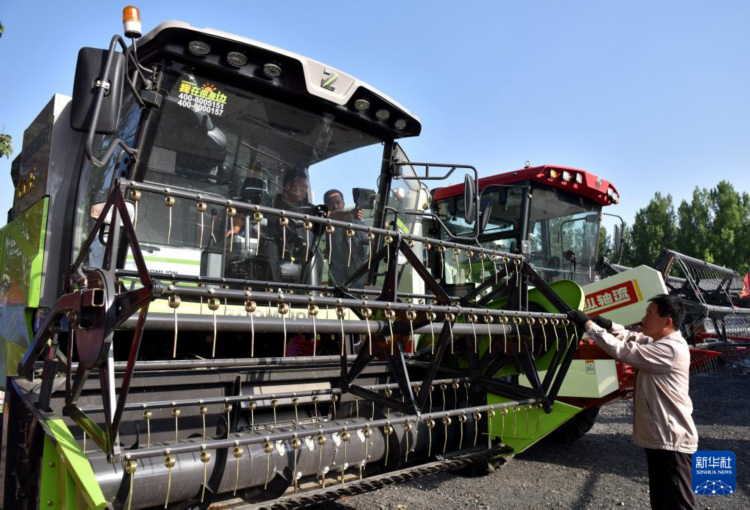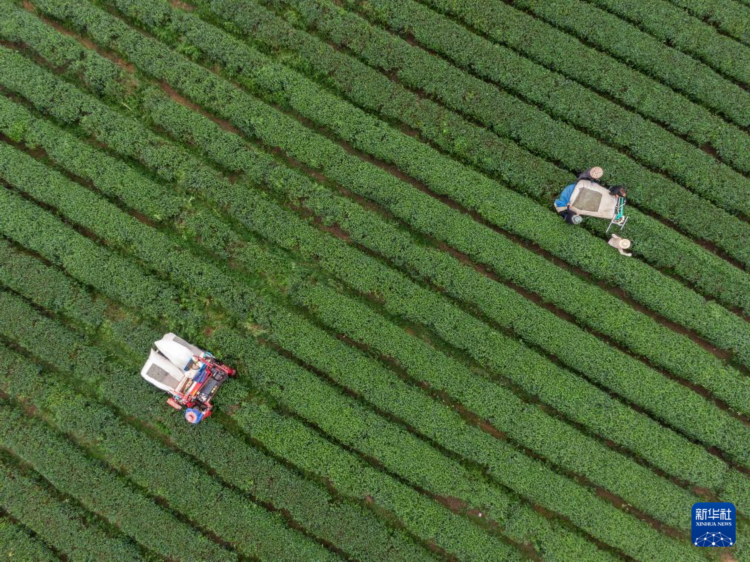It has been nearly a month since the crew of the Shenzhou 18 spacecraft entered the Chinese space station, and a series of space science experiments have been carried out in an orderly manner. This time, a group of special "passengers" - 4 zebrafish came to the space station with the astronauts. During the Shenzhou 18 mission, four zebrafish and four grams of goldfish algae will form a small aquatic ecosystem, realizing China's breakthrough in space cultivation of vertebrates.
Build small aquatic ecosystem
Zebrafish is a common ornamental fish with a body length of about 4-6 cm. It is named after many blue stripes from head to tail on both sides of the body. They are gentle, lively and active. When they swim in groups, they are like running zebras.
The four zebrafish that came to the "Space House" this time undertook the "heavy task" - with the help of a small aquatic ecosystem composed of zebrafish and goldfish algae, scientists will study the impact of space environment on the growth and development of fish, ecosystem operation and material cycle.
How is the life of zebrafish after entering the space station? Experts said that after the small controlled life ecological experiment module of the space station was transferred from the Shenzhou 18 astronaut to the life ecological experiment cabinet of the capsule for experiment, it is now in stable orbit and 4 zebrafish are in good condition.
Zheng Weibo, a researcher at the Shanghai Institute of Technical Physics of the Chinese Academy of Sciences, said that at present, astronauts have successfully carried out two water sample collection operations and one fish box replacement operation, and found that zebrafish showed abnormal directional behaviors such as belly back swimming, rotating movement and circling in microgravity. Subsequent scientists will use the returned recycled water samples, fish eggs and other samples, combined with relevant videos, to carry out research on the impact of space environment on the growth, development and behavior of vertebrates, and provide support for the research on the material cycle of space enclosed ecosystems.
Like humans, fish also face adaptability problems when they live in space. To this end, scientists have created a comprehensive ecosystem.
In the small controlled bioecology experiment module of the life ecology experiment cabinet in the Sky Quest Module, fish, plants and microorganisms are involved in cooperation - oxygen produced by algae photosynthesis is used for zebrafish to breathe, carbon dioxide exhaled by fish is used for algae photosynthesis, and feces produced by eating are used for algae growth. In terms of diet, scientists specially designed fish food and used syringes to promote "fish tanks".
This "space fish tank" looks very simple, but actually faces many known and unknown tests. What if there is not enough oxygen for fish to live in space? What to do when the water becomes muddy? In the face of possible problems, scientists have set up emergency oxygen supply system, water quality replacement system and many other "supporting" functions.
In order to make zebrafish survive better in the space station, astronauts must feed and supply oxygen to fish, provide nutrient solution and lighting for algae, meet the requirements of pH value, dissolved oxygen, temperature, conductivity and other indicators of the system, and conduct parameter adjustment, roe collection, waste disposal and other operations.
Provide help for understanding life science
In addition to studying the impact of space environment on the growth, development and behavior of vertebrates, scientists also expect zebrafish to spawn in space.
The breeding cycle of zebrafish is about 7 days, and it can reproduce 6-7 times continuously in a year, with a high egg production. Experts said that once a small fish is found ovulating, the system will start a special ovulation device to collect fish eggs.
Why did you choose zebrafish as the research object? According to experts, zebrafish is 87% similar to human genome, which is called "model organism" (a kind of organism that can be used to study and reveal some biological phenomena with universal laws of life). Arabidopsis and rice previously planted on the China Space Station are also "model organisms".
According to experts, zebrafish is small and has the characteristics of in vitro fertilization, in vitro development, and early embryo transparency. Scientists can fully observe and study its development process, which is of great significance for understanding human life science, disease prevention and treatment, and drug research and development.
In the 1970s, American geneticist George Stressinger made the first research on the developmental biology of zebrafish. Thanks to its characteristics, zebrafish has been widely used in many fields such as developmental biology, genetics, basic medicine, pharmacology, toxicology, drug research and development, and ecological environment assessment, and has become the "favorite" of biologists.
Zebrafish also entered space early. In 1976, zebrafish entered space with the Soviet "Salute V" space station. Over the next 10 years, the Soviet Union sent zebrafish into space and carried out in orbit biological load experiments through alliance rockets and space series satellites for many times.
In 2012, Japan sent an aquatic module to the Japanese experimental module of the International Space Station to study the effects of microgravity on marine organisms. Three years later, the Japanese experimental module used 18 zebrafish for muscle experiments, which provided reference and guidance for the development of astronaut health care strategies.
More than 90 practical (trial) tests of the space station have been carried out successively
In addition to "fish farming in space", Shenzhou 18 will also carry out more than 90 experiments (trials) in the fields of microgravity basic physics, space material science, space life science, aerospace medicine, aerospace technology and other fields, including the implementation of the first in orbit research on the function of plant stem tip stem cells in the world, Reveal the adaptive mechanism of plant evolution to gravity, and provide theoretical support for the subsequent directional design of space crops adapted to space environment.
Lin Xiqiang, spokesman of the China Manned Space Program and deputy director of the China Manned Space Program Office, said earlier that the China Space Station has implemented more than 130 scientific research and application projects in orbit, and has made important achievements in space life science, aerospace medicine, space material science, microgravity fluid physics, and published more than 280 papers in world-class journals.
Using the research project of new material space growth carried out by the high-temperature scientific experimental cabinet, China has for the first time obtained high-quality crystal materials that are difficult to prepare on the ground in space, which has a guiding role in the preparation of high-performance multi-component semiconductor alloy materials; The research on molecular targets for directional differentiation of human osteoblasts, biological basic research on the impact on skeletal muscle and other projects carried out by using the biotechnology laboratory cabinet provide new solutions for promoting the prevention and treatment of bone diseases such as fracture and spinal injury repair, as well as combating muscle atrophy and metabolic diseases.
Lin Xiqiang said that China will continue to adhere to the principle of application and benefit first, give full play to the advantages of the national space laboratory platform, and continue to produce more high-level achievements. (Liu Xuan)
d72e9448-c1ed-4332-be8e-97bd31b9da44.jpg)
d72e9448-c1ed-4332-be8e-97bd31b9da44.jpg)
329c276b-d6fd-4c4c-8423-dad59fe4e0a8.jpg)
732ff12a-7e1b-4ab6-8a39-caa66c87707e.jpg)
673ed301-592d-4a07-a7e7-7fdcc0eb9a06.jpg)



50762f76-a614-41a6-bff5-205099a0cb2b.jpg)
b660df74-87a9-40d8-88a9-fceae8b6a1ea.jpg)
448f2468-5eff-43d3-9cb4-820669408eee.png)
7216c438-903e-48ab-aa8e-85214254c153.jpg)
30dcd2e7-c91d-442d-bf30-8b3a294c49aa.jpg)
ec0088f8-5406-43be-acb6-fe7632663550.png)
f8be8372-24d1-4ef8-84eb-e0a67f1bb24a.jpg)
4b5b81b6-2ec0-455d-ab1e-640ea8c0a5cd.png)
ee5026ec-2ccb-4144-b278-c8f201ab2d33.jpg)

48a43e95-d0cb-4ac5-b623-aeb4639cb401.jpg)
3d20986e-eeba-483b-b0df-8af9255a4e49.png)
d93bba82-be6f-4737-bb76-aadc962b2245.png)
d99c12d4-b23a-40d2-b298-2d015ccd6fd1.jpg)
d6bc4a5a-5185-4e09-82f9-08a50bad75fa.jpg)
624773cb-240c-4fa3-a918-d38fb7942f85.jpg)
c57fef79-ad2c-454a-83ac-7f2d8edfc55e.jpg)
9d0c1564-19fe-4cbb-ac43-87391e41d16a.jpg)
c55285c1-1abd-4ad6-a35c-bfa9aa5c6160.jpg)
38098141-a983-444a-a483-e5fa4337f1cb.jpg)
14a8a953-ffa0-4467-9a21-fc702cb6bf7a.jpg)
506185f1-1347-472e-8795-200f2845e1bf.jpg)
00c453d4-0e3b-41ff-9b96-75f5375cd744.jpg)
1ccfc9f4-d89d-458e-9ce0-4429efbe0800.jpeg)
5361aa6e-8b86-43dc-a162-06f768352985.jpg)
df9033c8-344e-48c1-a490-f7dfae95bfc0.jpg)
0ae90967-0e9e-48d7-af36-91bed5dc42cf.png)
bfaf78a4-47c8-4551-9843-94d1562b02fd.jpg)
c8bc9d86-ae28-4b0d-974f-31962e05af1a.jpg)
b9f7c5de-4aa2-4f74-af04-adfcdbd2e874.jpg)
647388a7-8da6-4f9c-a9c3-337da530cd22.png)
9961763b-eee7-4a33-9f51-9395655dca47.jpg)
4c30bc9a-296a-4446-8946-766b1bd7f3fb.jpg)
195da790-a626-454c-8bc7-64e7dd7811d0.jpg)
10cb8424-df02-49ae-b2ac-134a39c7ad96.jpg)
dba7c3ed-1175-494e-a087-a3fe0fe79960.jpg)
5b5f8444-34ca-4f64-9aa1-f69262cbccc0.jpg)
0fdf7811-2bae-465c-a29a-45d8b748ca00.jpg)
462957c1-2831-4549-9193-b37d3b9961ab.jpg)
8ac45778-7283-4840-9324-97ad8ab4cc32.jpg)
e788b81a-1d4e-493e-81b6-72f4c26777b5.jpg)
d2884aed-06ae-43d7-ac6c-d8c56454eb53.jpg)
4043e074-d4ab-458e-9f09-102eda92c337.jpg)
39d9660d-c704-4215-bee4-3a5a98929f29.jpg)
fff53fbd-cfd1-4534-b25b-bb53fc3cc0f2.jpg)
3882aa8e-6de7-4a66-a533-bb75dcfb5dc7.jpg)
5f584818-ed8a-4c0b-a7b2-6f9e98ccd632.jpg)
73be9ef6-4e92-428c-92a0-bc8b77865043.jpg)
22f7ff41-2ee4-4cf2-a61f-4db7f99bb60c.jpg)
da146ef0-c8da-4687-8f04-6063738b4af2.jpg)
a3c24f87-293b-4a97-9e16-5575d923e888.jpg)
0d945ecf-429a-460a-99d4-69d953ceb705.jpg)
eec647e2-c397-44ff-8f35-8f29ffcdd883.jpg)
35713376-e49d-4029-b7bd-e3dd892e15c1.jpg)
cd14dd2a-5717-4e56-992d-1d2f632463d4.jpg)
e3be8acd-7052-4eb5-a4f4-c9768f452f2a.jpg)
1b858115-211c-43fc-9c3d-e8eb79db00b6.jpg)
c505c5ad-d00c-4c0f-b540-f9b4f8c8d919.jpg)
88b5a353-1359-42cf-b53f-fc728f089fc2.jpg)
2d29b371-f3ba-45b8-a954-d2cb04f44644.png)
403da7eb-fb1f-4994-8d29-eaf4bda8f2fd.jpg)



a5ae2009-362e-40db-b741-9b4aef65f3ff.png)
f8a78081-ec61-4865-b9e1-ebffc25854de.png)
b7fbc2e5-e961-44b7-bf5a-b3c4844c433a.png)







